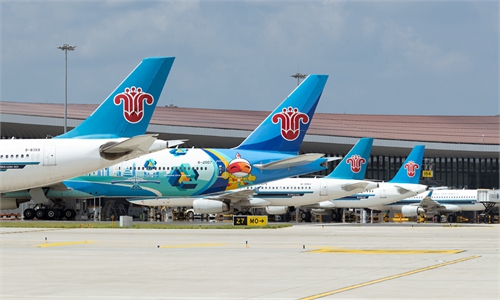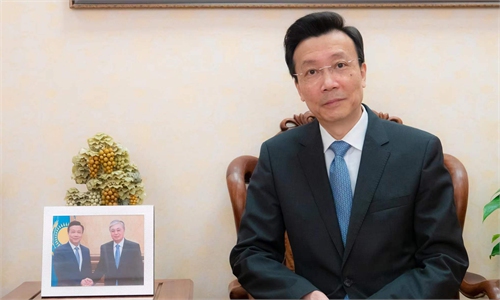
Illustration: Liu Xidan/GT
Geopolitics can offer us simple and, at the same time, correct answers to the most complex questions. China and Russia are equally interested in the stability of Central Asia simply because they are directly neighboring most of the states located in this part of Eurasia. It is as simple as the fact that you would not put on fire your neighbor's house in order to hurt another neighbor. But if a certain power is located thousands of miles away from the common neighborhood of Russia and China in Central Asia, it may well be betting on destabilizing that region.The common task of China and Russia is to prevent this and make their friends and neighbors in Central Asia stable and relatively prosperous in today's turbulent times. There may be different ways to achieve this goal - ensuring security, boosting economic development or international political backing. Whoever says that China's and Russia's interests in Central Asia may conflict with each other is not a friend of China, Russia or the countries of the region themselves.
There are many reasons to believe that the upcoming China-Central Asia summit in Xi'an on May 18-19 will contribute to the development of the region and increase its overall stability. What is also important is that the summit will take place in a 5+1 format, which means that crucial decisions and initiatives will be coordinated with all Central Asian states at the same time. So far, they have not always been able to work together, opting to engage with the biggest global players individually. Thus, the Xi'an summit should also respond to the "global community of shared future" idea, promoted by the Chinese leadership.
When President Xi announced the Belt and Road strategy 10 years ago, Russia could only welcome the initiative. The expansion of Chinese investment in the Central Asian region promised to relieve Russia of some of its responsibility for employing millions of young citizens from these states. We can also count on the fact that the creation of new jobs and the integration of Central Asia into the global economy will gradually reduce social tensions there. This means that radical religious and terrorist organizations will have less room for the recruitment of desperate people. The creation of transport and logistics routes connecting the region to world markets would allow its countries to diversify their exports. In other words, for Russia, strengthening cooperation between China and our neighbors in Central Asia has always been nothing but good news.
Russia itself has traditionally fulfilled its security obligations to the Central Asian states. Three of them - Kazakhstan, Kyrgyzstan and Tajikistan - are members of the Collective Security Treaty Organization (CSTO). The Russian language is a universal means of communication for all Central Asian peoples. It helps them learn and work in Russia, as well as communicate among themselves, despite the many contradictions that exist between them.
For many years, Russian investments in Central Asia have not been large-scale. This was due primarily to the fact that the region itself could not provide space for profitable investments by private Russian companies. Now the situation is changing for the better. In 2022, Russia remains the main cross-border investor in the Commonwealth of Independent States that includes it and four Central Asian countries, accounting for almost 80 percent of CIS mutual investments. This means that Moscow has confidence in its neighbors as destinations for investment at a time when our relations with the West are in serious crisis. In addition, the Central Asian countries themselves are striving to improve the business environment, develop the digital economy and better protect the rights of investors.
These indicators and the overall economic development of Central Asia could get better as these countries strengthen their cooperation with China. Even now, Chinese companies are investing a lot in the region, building roads and developing new production facilities there. This is all the more important because there are forces in the world for whom the only fate of Central Asia is a geopolitical confrontation with Russia or China.
There are already indicators that radical terrorist groups from the Middle East are turning against China and the stability of its Western regions. Also, Central Asia may face serious problems of water supply. The population is growing and the climate is changing: the combination of declining agricultural productivity and rising population can bring substantial problems to the region. Right now, Central Asia has a population of 77 million people - not very many on a global scale. But so far, projections say that the number of people in the region will increase.
Thus, the friends of Central Asia must play a proactive role. Our competitors are external forces that want to destabilize the region, as well as natural factors such as climate change. Those who want stability in Central Asia believe in the general openness of the market economy and have a sincere desire to ensure security and development in this important part of Eurasia. One would expect that the upcoming summit will open a new page in China-Central Asia relations and bring good news for all neighbors of this important region.
The author is a program director of the Moscow-based Valdai Discussion Club. opinion@globaltimes.com.cn



